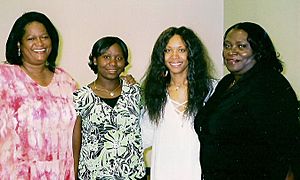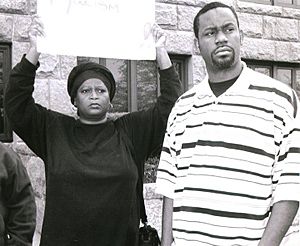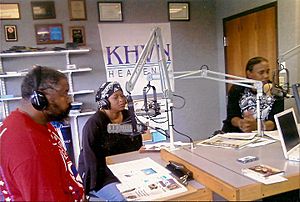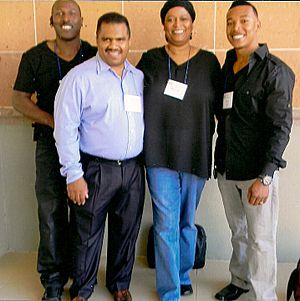Brenda Cherry facts for kids
Brenda Cherry (born March 19, 1958) is an American civil rights activist from Paris, Texas.
Cherry is the President and co-founder of Concerned Citizens for Racial Equality (CCFRE). This group helps people with civil rights issues in Paris, Texas. CCFRE started in 2003. It has worked with important organizations like the U.S. Department of Justice and the American Civil Liberties Union.
Growing Up
Brenda Cherry grew up in Blossom, Texas. Her father was a farmer, and her mother worked in homes. Brenda went to T.G. Givens, a school in Paris, Texas, that was only for Black students at the time. She had to ride a bus 10 miles to get there, even though there was a school closer to her home.
Later, schools were required to allow all students, no matter their race. Brenda then went to the school in Blossom that used to be only for white students. She finished high school at Prairiland High School. She also went to college at Paris Junior College and East Texas State University. Before becoming an activist, Brenda worked as a nurse for nine years. She has two daughters, Shauncia and Tiffany, and one son, Rico.
Standing Up for Rights
Brenda Cherry is known for her work helping people who face unfair treatment. She has led many protests and worked to bring attention to important issues in her community.
Helping Students
Schoolyard Incident
In October 2003, an 11-year-old Black student was reportedly hurt by a principal at Crockett Middle School in Paris, Texas. The child was sent to a detention center. Brenda Cherry and a small group, including the child's family, protested outside the school. During the protest, the child was released. This event was one of the first protests Brenda led.
Shaquanda Cotton's Case

Shaquanda Cotton was a 14-year-old Black student in Paris, Texas. In March 2006, she was arrested for allegedly pushing a school hall monitor. Even though she had never been in trouble before, Shaquanda was sentenced to up to seven years in a youth prison. Around the same time, a 14-year-old white girl with a past record received only probation for a serious crime.
A writer named Darwin Campbell shared Shaquanda's story, which brought a lot of attention to her case. After she had been in prison for over a year, a story in the Chicago Tribune made her case known across the country. A big protest was held in Paris, Texas. About two weeks after the newspaper article and protest, Shaquanda was released. Brenda Cherry was interviewed by the BBC about the case, and it was even part of a BBC documentary.
Brandarian Thomas's Story
Brandarian Thomas was a 14-year-old Black student in Paris, Texas. In June 2008, police arrested him at his home. He was accused of touching a female student in class, but he said he didn't do it. Brandarian's mother contacted Brenda Cherry. Brenda helped convince her to go to trial instead of taking a deal that would make him admit guilt.
Brenda Cherry believes that Black students in Paris schools are often punished more harshly for small things. She said, "The black kids are punished more often, more harshly." Even though prosecutors offered Brandarian a deal, Brenda helped his mother decide to go to trial.
Bullying of an Autistic Student
In April 2011, a 14-year-old Black student with autism was taken into a greenhouse at Paris High School by an 18-year-old white student. The older student put a rope around the younger student's waist. He also hit the younger student's hand with a stick. The older student's girlfriend recorded the incident and laughed.
When they returned to class, a teacher took the recording and erased it. The school did not punish the older students or the teacher. Brenda Cherry and CCFRE helped the mother and her son. Brenda led protests about the incident. The case is now being looked into by the U.S. Department of Education.
Other Important Cases
Brandon McClelland's Case

Brandon McClelland was a 24-year-old Black man from Paris, Texas. In September 2008, his body was found on a farm road. The local newspaper said it was a hit-and-run by a truck. Because of Brenda Cherry and Concerned Citizens for Racial Equality, the case gained national attention.
There were questions about how Brandon died. Brenda Cherry spoke to USA Today, saying, "Authorities have not seriously considered the possibility that this was a hate crime." Further investigation showed Brandon was last seen with two white men. These men were charged with killing Brandon, but the charges were later dropped due to a lack of evidence.
Brenda Cherry told CBS News, "His body was dragged and nobody gets charged? It's not surprising, but it's sad. It appears that a black man's life means nothing here in Paris." Brenda has led many protests about this case. The investigation into Brandon's death is still open.
Cornelius Gill's Incident
Cornelius Gill was an 18-year-old Black high school student in Paris, Texas. In November 2009, a police officer questioned him about a stolen car. When Cornelius refused to be questioned, the officer arrested him. Brenda Cherry saw part of what happened. She and Cornelius's mother filed a complaint with the Paris Police Department. Brenda got a video of the incident.
Cornelius was sentenced to 100 days in jail. The officer claimed Cornelius attacked him, even though the video did not show this. The officer was suspended for a short time, but the suspension was lifted. Brenda Cherry told the Huffington Post that the ruling made her fearful. She said, "What's going to stop the officer from doing that again and again?"
Bobby Yates's Case
Bobby Yates was a 51-year-old Black man in Paris, Texas, who had a disability. In 2008, he called 911 because a teenage girl and two men would not leave his home. When police arrived, the girl made a serious accusation against him. The police sided with the girl, and Bobby Yates was arrested.
Brenda Cherry and her organization held protests and filed complaints for Bobby Yates. After three years, the charge against him was dropped.
Aaron Hart's Sentencing
Aaron Hart was 18 years old when he was arrested and charged with a serious offense. Aaron has an intellectual disability and a very low IQ. At his trial, his lawyer did not call witnesses or get an independent doctor to check his ability to understand the trial. In June 2009, Judge Eric Clifford sentenced Aaron to 100 years in prison. Around the same time, the same judge sentenced another person with the same offense, but without a disability, to only four years.
Brenda Cherry and her organization helped Aaron. Many protests were held. The case gained national attention. Brenda Cherry told the Los Angeles Times, "How could the judge not take his mental ability into consideration?" Aaron was given a new trial. He later accepted a deal and was sentenced to 10 years in prison.
Turner Industries Investigation
Turner Industries is a large company with locations in many states, including Paris, Texas. In February 2009, Brenda's group received complaints and photos from the Paris plant. These showed racist drawings, symbols, and unfair pay and promotions for Black workers.
Brenda's activism led to a federal investigation by the Equal Employment Opportunity Commission. This led to a lawsuit that was settled, and the company changed its practices. Brenda Cherry said, "One of my biggest concerns... is the mentality of those who put it there." The investigation into Turner Industries was one of the largest civil rights investigations ever in Texas.
Continuing Her Work
Brenda Cherry and Concerned Citizens for Racial Equality worked with the U.S. Department of Justice for a community meeting. Brenda said, "I'm here to talk about racism. I don't see any sense in playing games, pretending it doesn't exist." She pointed out that in schools, mostly Black kids were in detention, and in court, Black people often received higher bail and longer sentences.
Brenda Cherry also worked with Lone Star Legal Aid, a law firm, to gather information. They found that the Paris Independent School District punished Black students eight times more often than white students, even though Black students were a smaller part of the student population. Brenda told The New York Times, "If you complain about anything, you are going to be punished."
Brenda Cherry continues to work for civil and human rights, addressing issues of race and fairness in her community.
Images for kids





